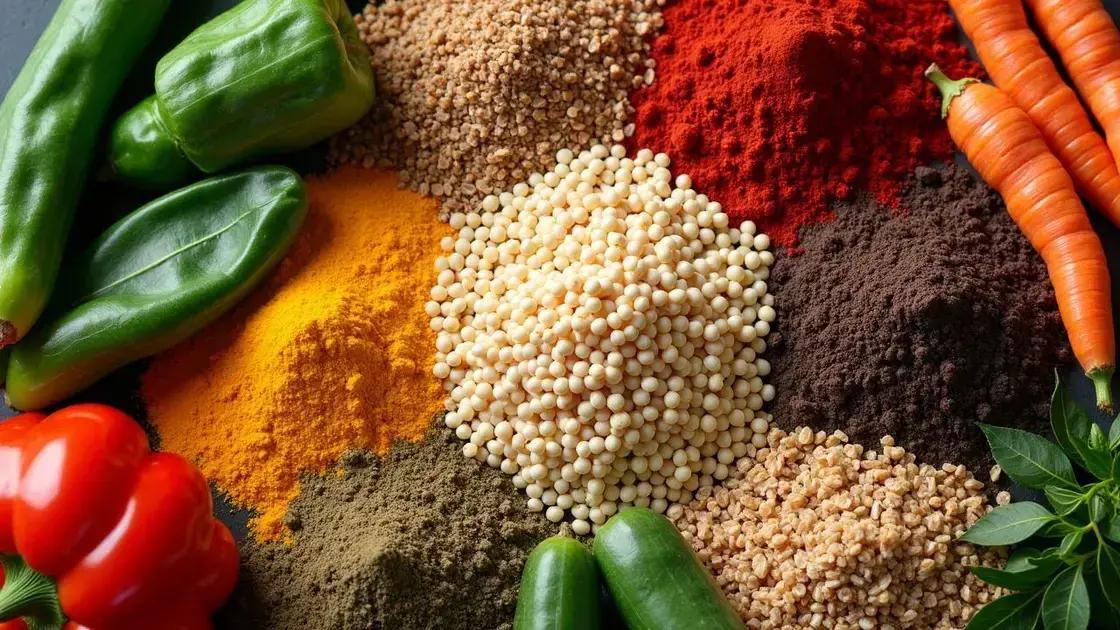The African recipe offers a wealth of health benefits supported by scientific research, emphasizing the importance of traditional, nutrient-dense ingredients and the cultural significance behind each dish.
Have you ever wondered about the scientific evidence behind the African recipe? These traditional dishes are not just delicious but also come packed with health benefits supported by research. As we delve into the rich culinary traditions of Africa, we uncover the nutritional value and cultural significance that make these recipes worth exploring. In this article, we’ll discuss the health benefits, cultural importance, and how unique ingredients work together to create flavors that are both savory and healthy.
Understanding the Cultural Significance of African Recipes

Understanding the cultural significance of African recipes is essential to appreciate their rich history and diversity. African cuisine is not just about the food; it represents traditions, values, and identities. Each dish tells a story, rooted in the land, community, and family.
The Role of Community
Cooking and sharing meals are vital parts of African culture. These recipes often originate from communal practices, where families gather to prepare meals together. This tradition fosters unity and nurtures relationships, reinforcing connections across generations.
Ingredients and Their Meanings
The ingredients used in African recipes are often symbolic. For example, millet represents resilience, while yam symbolizes abundance. Many dishes incorporate local ingredients that showcase regional traditions, further emphasizing the connection to the land.
Celebrations and Festivals
Festivals and special occasions often feature traditional African recipes. These events highlight the importance of food in cultural celebrations, serving as a way to honor ancestors and unite communities. Dishes served during these times hold deep emotional significance and are prepared with care.
Through understanding the cultural significance of African recipes, one can appreciate not just the flavors but also the stories and traditions that have shaped these dishes through time. Exploring these elements can deepen our connection to the diverse cultures within Africa.
The Health Benefits Supported by Scientific Research

Research shows that many African recipes offer several health benefits. These dishes often use nutrient-dense ingredients, which can contribute to improved health outcomes. Studies indicate that traditional foods can help reduce the risk of chronic diseases.
Rich in Nutrients
Many African recipes include ingredients that are rich in vitamins and minerals. For instance, leafy greens like amaranth and collard greens are packed with vitamins A, C, and K, which are essential for maintaining overall health. Incorporating these into meals can boost nutrient intake.
Promoting Digestive Health
Traditional African dishes often contain fiber-rich ingredients, such as beans and whole grains. High fiber intake is linked to better digestive health and may help prevent constipation. Evidence suggests that fiber can also promote gut health by supporting beneficial bacteria.
Heart Health Benefits
Many recipes feature healthy fats from sources like avocado and nuts. Research indicates that these fats may help lower cholesterol levels, reducing the risk of heart disease. Additionally, spices such as turmeric and ginger are known for their anti-inflammatory properties, contributing to heart health.
Overall, the integration of these ingredients into diets not only enriches meals but also offers various health advantages. Continued research supports the idea that African recipes can play a key role in maintaining a balanced and healthy diet.
How Traditional Ingredients Make a Difference

Traditional ingredients in African recipes do more than just enhance flavor; they play a vital role in health and nutrition. Using these authentic ingredients makes a significant difference in the overall quality of meals.
Local Sourcing for Freshness
Many African recipes utilize locally sourced ingredients, which ensures freshness and maximum flavor. When ingredients are picked at their peak, they retain more nutrients. This practice also supports local farmers and communities.
Emphasis on Whole Foods
Traditional African cooking often emphasizes whole foods, such as grains, vegetables, and legumes. Whole foods provide essential nutrients and promote better health. For instance, millet, sorghum, and teff are ancient grains rich in fiber, protein, and minerals.
Unique Spices and Herbs
Spices and herbs unique to the African continent contribute not only flavor but also health benefits. Ingredients like berbere, cinnamon, and fenugreek have been used for centuries and are known for their anti-inflammatory and antioxidant properties. These can enhance digestion and improve overall well-being.
By focusing on these traditional ingredients, African recipes not only preserve cultural heritage but also promote a healthier lifestyle. Their diverse flavors and nutritional benefits create meals that nourish both body and soul.
Bringing It All Together
Understanding the scientific evidence behind African recipes reveals the incredible health benefits and cultural significance embedded in each dish. By exploring traditional ingredients and their unique properties, we appreciate how they contribute to a nutritious diet and a rich culinary heritage.
As we incorporate these recipes into our diets, we not only enjoy delicious flavors but also promote better health outcomes. The remarkable connection between food, culture, and nutrition in African cuisine encourages us to celebrate and share these traditions.
Ultimately, the journey into African culinary practices enriches our lives and promotes a healthier lifestyle, making it an experience worth savoring.
FAQ – Frequently Asked Questions About African Recipes
What are the health benefits of traditional African recipes?
Traditional African recipes often include nutrient-dense ingredients that may help reduce the risk of chronic diseases and promote overall health.
Why are local ingredients important in African cooking?
Local ingredients ensure freshness and maximum flavor, while supporting local farmers and communities.
How do traditional ingredients enhance the flavor of dishes?
Traditional ingredients like unique spices and herbs add depth and richness, making meals more flavorful and satisfying.
Can African recipes fit into a modern diet?
Absolutely! African recipes can be adapted to fit contemporary nutritional needs while preserving their cultural significance.
What role do spices play in African cuisine?
Spices are not only key flavoring agents but also offer health benefits, such as anti-inflammatory and antioxidant properties.
How do traditional African recipes promote community?
Cooking and sharing meals is a communal activity, fostering connections among families and reinforcing cultural identities.













